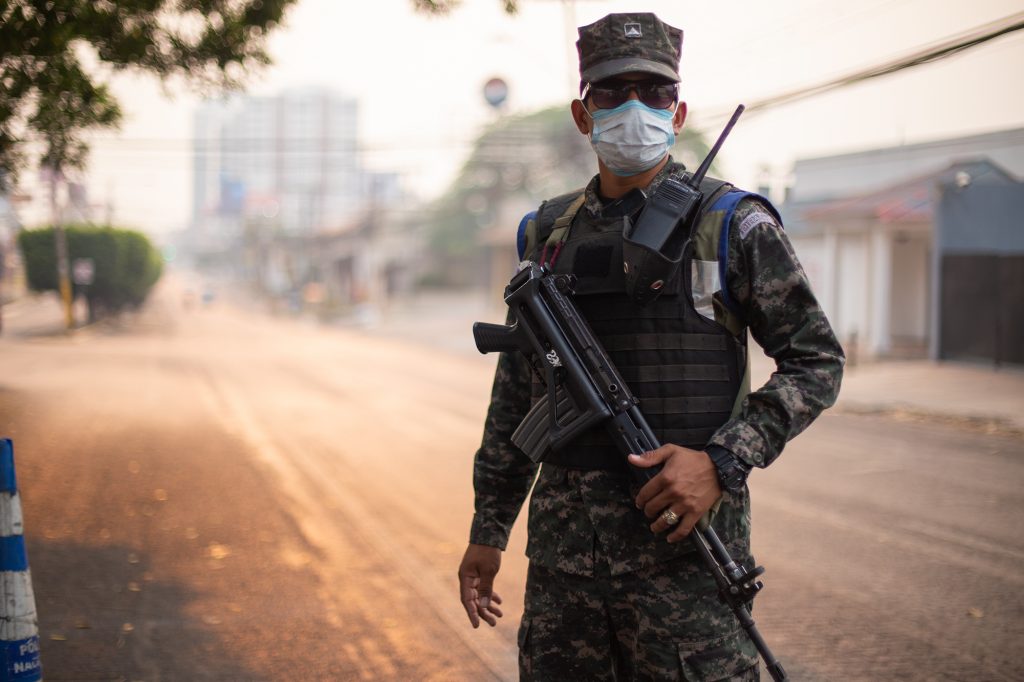On May 5, the Legislative Assembly of El Salvador, now controlled by President Nayib Bukele’s New Ideas political party, approved a law that removes almost all controls over pandemic-related government procurements. It is an alarming confirmation of a research study’s results demonstrating how the public health crisis has reinforced the autocratic leanings of Honduras, Guatemala, El Salvador and Nicaragua.
By Celia Pousset
Photos by Martín Cálix
The COVID-19 Pandemic’s Impact on Fragile Democracies, a recent study sponsored by the Heinrich Boll Foundation, analyzes the pandemic responses of four Central American governments. How did the leaders of Honduras, Guatemala, El Salvador and Nicaragua handle the crisis and what impact did their actions have on their respective democracies? This research study conducted numerous surveys and interviews to explore this fundamental question.
The four Central American governments declared states of emergency, national disasters and other crisis conditions, which included measures curtailing civil liberties such as lockdowns, public health checkpoints and barriers, and company closures. To justify these measures, these countries cited public welfare and health, and respect for human life. However, the study notes, “The various measures adopted do not seem to have affected the number of cases and deaths. But the impact of these measures can be seen in other areas, such as governance.” The study analyzes whether the severity of the public health crisis justified these extraordinary measures and the resulting inconsistencies and abuses of power.
The military as “heroes” of the homeland
The study finds it worrisome that security forces, especially the military, took a prominent role in the pandemic responses of these nations; “Democracy is always weakened when the armed forces replace civil institutions.” It contends that the COVID-19 pandemic was combated “like a war” or a “security problem,” which is why it was necessary to deploy the military. In Honduras, the assignment of non-military tasks to the Armed Forces, such as delivering food assistance or assuming administrative control of some hospitals, is symptomatic of what the study calls the “culture of authoritarianism.”
«The symbolism inherent in positioning the military as the most powerful institution in the country is concerning,” write Otto Argueta and Marco Pérez Navarrete, co-authors of the research study».
In El Salvador, President Nayib Bukele heaped praise on the military by calling them “heroes of the homeland dedicated to improving our national well-being.” At the same time, his vehement verbal assaults on the public had the effect of legitimizing the excessive use of force by the police and military.
The study’s co-authors, Otto Argueta and Marco Pérez Navarrete, quote Bukele exhorting security forces to “be tougher with people in the streets, people who are violating the quarantine. I don’t care if they post ‘They confiscated my car! They twisted my arm!’” on social media.
Guatemala experienced a similar militarization of the pandemic response and an increase in institutional tolerance of human rights violations.
Lack of transparency, breaches of democracy
One of the study’s main findings is that the ongoing erosion of democratic principles intensified in the past year. This was manifested in Honduras by the suspension of constitutional guarantees, and in Guatemala by the application of religious principles in crisis management processes. El Salvador experienced violent assaults on the legitimacy of political opponents and on independent journalism.
The situation in Nicaragua was even more serious in light of the government’s outright denial of the very existence of a pandemic. Interviews with the Nicaraguan public were summed up in the report as follows: “The [Nicaraguan] perception of the local pandemic response differs from the rest of the region, primarily because some of the people interviewed said there was no response at all.”
The Nicaraguan government’s denial of the disease, added to its attempts to hide its devastating impacts on its citizenry, led the United Nations High Commissioner for Human Rights to criticize the government. The UNHCR also reported 43 complaints of human rights violations between March and June 2020. President Daniel Ortega’s response to these reproaches was to play the victim, alleging disinformation and hate campaigns against his government.
The Ortega administration took advantage of the public health crisis to pass laws that undermine political pluralism, such as the Regulation of Foreign Agents Law, which prohibits anyone who has received foreign funds from seeking public office, and the Cybercrime Law which criminalizes independent journalism.
Amnesty for crimes committed during the pandemic?
Pandemic-related resource management has been a common problem throughout the region. The report highlights inconsistencies in Guatemala’s distribution of resources, and cites a number of sources that indicated, “The criteria for resource allocation have been deficient, and it is suspected that government funds have been misappropriated through influence peddling, corruption and clientelism.”
In Honduras, the state of emergency resulted in the unrestrained use of public resources for irregular purchases that are now being investigated by the Public Prosecutor’s Office. The report contends that, “Transparency and accountability mechanisms have been scrapped” in El Salvador. Even though El Salvador supposedly allocated the most money to fight the pandemic, much of it was spent on government publicity campaigns touting its pandemic response.
Now that President Nayib Bukele and his New Ideas party control the Legislative Assembly, and legislators have voted to eliminate controls on government purchases of medical supplies for COVID-19, many Salvadorans are wondering how much this will erode their democracy.
The report contends that the political management of the pandemic widened the gap between citizens and their elected representatives, resulting in a new surge of distrust of the government. The report concludes that the governments studied are using the public health crisis to dismantle democratic institutions in Central America.







